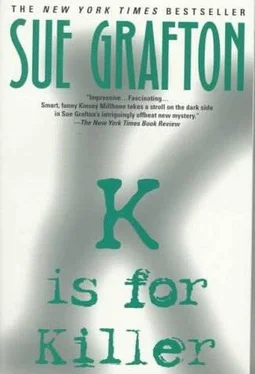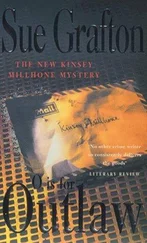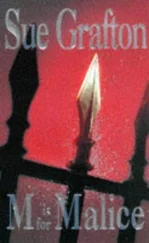"What are you up to?" I said to Cheney.
"Nothing much. I'll be going down to lower State Street later tonight, looking for a guy with some information I want. I thought you might like to ride along. An old girlfriend of Lorna's tends to hustle her butt in the same neighborhood. If we spot her, I can introduce you… if you're interested, of course."
My heart sank as visions of an early bedtime evaporated. "It sounds great. I appreciate the offer. How do you want to work it? Shall I meet you down there?"
"You can if you like, but it's probably better if I swing by and pick you up on the way. I'll be cruising a big area, and it's hard to know where I'll be."
"You know where I live?"
"Sure," he said, and rattled off my address. "I'll be there about eleven."
"That late?" I squeaked.
"The action doesn't even get rolling 'til after midnight," he said. "Is that a problem?"
"No, it's fine."
"See you then," he said, and hung up.
I glanced at my watch and noted with despair that I had about four hours to kill. All I really wanted was to hit the sack, but not if I was going to have to get up again. When I'm down, I like to stay down. Naps leave me feeling hungover without the few carefree moments of an intervening binge. If I was going to drive around with Cheney Phillips until all hours, I thought I'd be better off staying on my feet. I decided I might as well conjure up some work in the interim. I drank two cups of coffee and then paid Rosie for my dinner, taking my jacket and handbag as I headed out into the night.
The sun had set at 5:45, and the moon probably wouldn't be rising until 2:00 A.M. At this hour, everybody in the neighborhood was still wide awake. In almost every house I passed, front windows glowed as if the rooms within were aflame. Night moths like soft birds batted ineffectually against the porch bulbs. February had silenced all the summer insects, but I could still hear a few hearty crickets in the dry grass and an occasional nightbird. Otherwise, the quiet was pervasive. It seemed warmer than last night, and I knew, from the evening paper, that the cloud cover was increasing. The winds were northerly, shaking through the thatch of dried palm fronds above me. I walked the half block to my apartment and let myself in briefly to check for messages.
There was nothing on my machine. I went out again before I yielded to the temptation to call Cheney and cancel tonight's big adventure. The squeak in the gate seemed like a melancholy sound, cold metal protesting my departure. I got in my car and turned the key in the ignition, cranking the lever for the heater as soon as the engine roared to life. There was no way the system could deliver hot air so soon, but I needed the illusion of coziness and warmth.
I headed out the 101 for half a mile and took the Puerta Street off-ramp. St. Terry's Hospital was only two blocks down. I found a parking space on a side street, locked the car, and walked the remaining half block to the front entrance. Technically, visiting hours didn't start until eight, but I was hoping the nursing director on the cardiac care unit would bend the rules a bit.
The glass doors slid open as I approached. I passed the hospital cafe to the left of the lobby, with its couches arranged in numerous conversational groupings. Several ambulatory patients, wearing robes and slippers, had elected to come down and sit with family members and friends. The area was rather like a large, comfortably furnished living room, complete with piped-in music and paintings by local artists. The scent in the lobby was not at all unpleasant but nonetheless reminded me of hard times. My aunt Gin had died here on a February night over ten years ago. I shut the door on the thought and all the memories that came with it.
The gift shop was open, and I did a quick detour. I wanted to buy something for Lieutenant Dolan, though I couldn't think quite what. Neither the teddy bears nor the peignoirs seemed appropriate. Finally I picked up an oversize candy bar and the latest issue of People. Entering a hospital room is always easier with an item in hand-anything to smooth your intrusion on the intimacies of illness. Ordinarily I wouldn't dream of conducting business with a man in his pajamas.
I paused at the information desk long enough to get his room number and directions to CCU, then hiked down countless corridors toward the bank of elevators in the west wing. I punched the button for three and emerged into a light, airy foyer with a glossy, snow-white floor. I turned left into a short hallway. The CCU waiting room was just to the right. I peered through the glass window set into the door. The room was empty and spare: a round table, three chairs, two love seats, a television set, pay phone, and several magazines. I moved over to the door leading into CCU. There was a phone on the wall and beside it a sign advising me to call in for permission to enter. A nurse or a ward clerk picked up the call, and I told her I wanted to see Lieutenant Dolan.
"Wait a minute and I'll check."
There was a pause, and then she told me to come on in. The curious thing about illness is that a lot of it looks just like you'd expect. We've seen it all on television: the activity at the nurses' station, the charts and the machinery designed to monitor the ailing. On the cardiac care unit, the floor nurses wore ordinary street clothes, which made the atmosphere seem more relaxed and less clinical. There were five or six of them, all young and quite friendly. Medical personnel could oversee vital signs from a central vantage point. I stood at the counter and watched eight different hearts beat, a row of green spiky hiccups on screens lined up on the desk.
The ward itself was done in southwestern colors: dusty pinks, mild sky blues, cool pale greens. The doors to each room were made of sliding glass, easily visible from the nurses' station, with draw drapes that could be pulled shut if privacy was required. The feel of the unit was as clean and quiet as a desert: no flowers, no artificial plants, all the laminate surfaces plain and spare. The paintings on the walls were of desert vistas, mountains rising in the distance.
I asked for Lieutenant Dolan, and the nurse directed me down the corridor. "Second door on the left," he said.
"Thanks."
I paused in the doorway of Lieutenant Dolan's room, which was sleek and contemporary. The bed he rested on was as narrow as a monk's. I was used to seeing him on the job, in a rumpled gray suit, grumpy, harassed, completely businesslike. Here he seemed smaller. He was wearing an unstructured, pastel cotton gown with short sleeves and a tie back. He sported a day's growth of beard, which showed prickly gray across his cheeks. I could see the tired, ropy flesh of his neck, and his once muscular arms were looking stringy and thin. A floor-to-ceiling column near the head of his bed housed the paraphernalia necessary to monitor his status. Cables pasted to his chest looped up to a plug in the column, where a screen played out his vital signs like a ticker tape. He was reading the paper, half-glasses low on his nose. He was attached to an IV. When he caught sight of me, he set the paper aside and took his glasses off. He gave the edge of the sheet a tug, pulling it across his bare feet.
He motioned me in. "Well, look who it is. What brings you down here?" He ran a hand through his hair, which was sparse at best and now looked as if it had been slicked back with sweat. He pushed himself up against the angled bed. His plastic hospital bracelet made his wrist seem vulnerable, but he didn't seem ill. It was as if I'd caught him on a Sunday morning, lounging around in his pajamas before church.
"Cheney told me you were laid up, so I thought I'd pop by. I hope I didn't interrupt your paper."
"I've read it three times. I'm so desperate I'm down to the personals. Somebody named Erroll wants Louise to call him, in case you know either one."
Читать дальше












